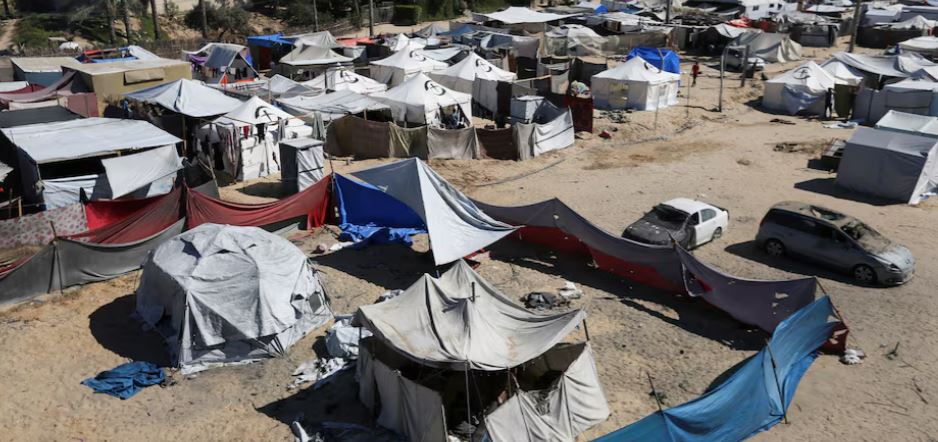Renewed Violence and Evacuation Orders in Gaza
The persistent conflict in Gaza has reached another grim milestone as Israeli forces have issued new evacuation orders for neighborhoods in southern Gaza. This move comes in response to what Israel describes as renewed attacks from Hamas militants. The escalation has led to a tragic loss of life, with at least 16 Palestinians, including children and women, killed by Israeli tank shelling and airstrikes near Khan Younis, according to Gaza medics.
The humanitarian crisis in Gaza continues to deepen. The Israeli military’s strategy involves adjusting the boundaries of a designated humanitarian zone in Al-Mawasi to facilitate civilian evacuations and minimize their exposure to ongoing combat operations. However, Palestinian health officials and international relief agencies argue that there is no truly safe place left in Gaza, given the intensity and frequency of the attacks.
Impact on Civilians and Health Institutions
The recent wave of violence has exacerbated the already dire situation for Gaza’s civilian population. Reports from the Gaza health ministry indicate that the fatalities from the latest attacks include six children and four women, with dozens more wounded. These figures underscore the indiscriminate nature of the violence affecting non-combatants. Hamas media outlets report even higher numbers, suggesting the death toll may be as high as 26.
The evacuation orders have sparked a significant humanitarian response. Health officials at Nasser Hospital in Khan Younis have issued urgent appeals for blood donations due to the overwhelming number of casualties. Images captured by Reuters depict the harrowing scenes of injured individuals, including children, being rushed to medical facilities amidst the chaos. One poignant account describes a family being torn apart in their sleep, illustrating the profound human cost of the conflict.
Despite the evacuation orders, many health institutions in Gaza remain operational, though they are under immense pressure. The Palestinian Civil Emergency Service has reported that rescue teams are struggling to reach the eastern outskirts of Khan Younis due to the severity of the bombardment, leaving many wounded and dead inaccessible.
Ongoing Ceasefire Efforts and International Response
Efforts to broker a ceasefire, primarily led by Qatar and Egypt with backing from the United States, have so far been unsuccessful. The conflicting parties continue to blame each other for the breakdown in negotiations. The Israeli Prime Minister, Benjamin Netanyahu, has recently directed a delegation to engage in hostage negotiation efforts, reflecting the complex and multi-faceted nature of the conflict.
The Israeli offensive, which began after a deadly cross-border assault by Hamas militants on October 7th of the previous year, has resulted in the deaths of at least 38,000 Palestinians, according to Gaza health authorities. Israel’s stated goal is the eradication of Hamas, following the group’s attack that killed 1,200 Israelis and resulted in the taking of over 250 hostages.
The international community remains deeply concerned about the humanitarian impact of the conflict. Calls for restraint and adherence to international humanitarian law have been echoed by various global actors, yet the situation on the ground remains volatile. The United Nations and numerous non-governmental organizations continue to emphasize the urgent need for a durable ceasefire and the protection of civilian lives.
Summary
The ongoing conflict in Gaza has intensified with new Israeli evacuation orders and renewed violence, resulting in significant civilian casualties. Despite efforts to establish a ceasefire, the humanitarian crisis continues to escalate, highlighting the urgent need for international intervention and peace negotiations.
Key Learning Points
| Key Learning Points |
|---|
| New Israeli evacuation orders issued in southern Gaza |
| Israeli tank shelling and airstrikes kill at least 16 Palestinians |
| Humanitarian crisis worsens as health institutions struggle |
| Efforts to establish a ceasefire remain at an impasse |
| International community calls for adherence to humanitarian law |
Soumya Smruti Sahoo is a seasoned journalist with extensive experience in both international and Indian news writing. With a sharp analytical mind and a dedication to uncovering the truth, Soumya has built a reputation for delivering in-depth, well-researched articles that provide readers with a clear understanding of complex global and domestic issues. Her work reflects a deep commitment to journalistic integrity, making her a trusted source for accurate and insightful news coverage.



